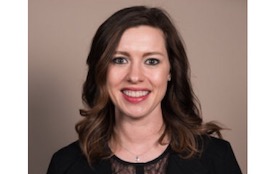“Conversations with Alumni” – Stacey Nadolny MAI ‘05
Margil Quijano, a senior in the Hotel School, had the chance to interview Stacey Nadolny MAI ‘05, Managing Director and Senior Partner with HVS in Chicago.
What was your favorite course in the hotel school?
During my time at the hotel school, I enjoyed taking courses that were related to my concentration, hotel design. The drafting class with Professor Richard Penner was one of my favorites; it helped me better understand the thoughtful design and complex planning that goes into building a hotel. I also loved the restaurant courses, and the restaurant concept class with Stephani Robson was another stand-out. But, I also took a lot of really unique and interesting classes outside of the Hotel School, including a Wood Shop class in the Ag School (I think I was the only Hotelie to have ever taken that course) and a Supermarket Retail class. That is one of the best things about Cornell—”an institution where any person could find instruction in any study”.
What did you do after graduation?
Once I realized that a career in hotel and restaurant design required further education and credentials, I decided to pursue my passion for food. I had grown up in restaurants and had always worked in food and beverage (aside from a short stint as a valet at the Statler), so I interviewed primarily with restaurant and catering groups my senior year. I was fortunate to secure an opportunity in the management training program with Hillstone, and worked with them in three cities for about a year and a half.
I figured out pretty early on that operations was not a life-long career for me, but I worked hard to absorb as much as possible while I was there. In the restaurant management role, I was able to learn how to run a profitable business, how to think on my feet, and how to handle guest complaints, and that maintaining high standards are everything to a consistent guest experience. The experience truly humbled me and made me recognize the value of the customer interaction—in every business setting.
I was able to survive as a young manager by learning from the seasoned managers that became my mentors. All of them had more than ten years of experience, and I was lucky enough that two of them were women, which helped me realize the potential for female leadership in the hospitality industry, as well as how to carry myself in a male-dominated field.
How did you transition from operations into consulting?
The SHA alumni network can be credited with my transition into consulting. I was attending the New York Hotel Show alumni event after I left Hillstone and was on the job hunt. I ran into a former classmate employed by HVS who told me about an opportunity available in the Dallas office. I was very interested in moving into a more analytic role in consulting, and I jumped at this opportunity and applied in December 2006.
While I had limited exposure to real estate as a restaurant manager or in school, I spent a lot of time studying the financial statements at my restaurant and really enjoyed the finance and accounting classes at Cornell. Additionally, HVS offered appraisal training and internal training that was unparalleled at that time, and it allowed me to catch on very quickly once I started in January 2007. This helped me develop my analytical skills that, paired with the training and resources that HVS offers, has enabled me to succeed in my current role.
What does your day to day look like?
In my current position, I am responsible for overseeing my team of six associates based in the Midwest. My other tasks include business development, client management, supervising appraisals and market studies, speaking at conferences, and creating connections in the hospitality industry, especially the within the Cornell Hotel Society. For hotel consulting work, we work with developers and help them make decisions related to their hotel projects. Prior to becoming a Managing Director, my role as an associate included site inspections and interviews the hotel managers, market participants, and economic officials, which I still get to do from time to time.
After we conducts the research, we sit down and run the analysis. The most important part is the analysis and having support for the conclusions we make as market experts. Everything is data driven, such as occupancy, average rate, and financial performance; it is important to weave through what we gathered in order to find the facts.
What do you see as the most prevalent trends in the hospitality industry?
One of the biggest trends is the integration of technology and how it has facilitated the sharing of information. It has greatly influenced how hotel rooms are booked and how hotels are marketed. Today, guests turn to social media sites, such as Instagram, Facebook, and Yelp, to research the hotels, and the “Instagram Effect” has certainly made its way to help bring popularity to Instragramable food and destinations in hotels. For example, this year in Chicago, the “Bean” (Cloudgate) overtook Navy Pier as the most visited destination, credited to everyone wanting to take a selfie with a big round mirror sculpture!
Another trend is the changing dynamic of food and beverage. Hoteliers are catching on that strong food and beverage drives guests to your property, and a restaurant not longer has to be a loss leader on your P&L. There are more and more hotels outsourcing their outlets for new concepts to local restaurant groups and celebrity chefs. Combined with the surge in food bloggers/Instagramers, hotel restaurants are targeting these influencers to put them on the map.
* * *
The Cornell Hotel Society Executive Board thanks the Cornell Hotel Society – Collegiate Chapter for initiating and conducting the “Conversations with Alumni” project.



